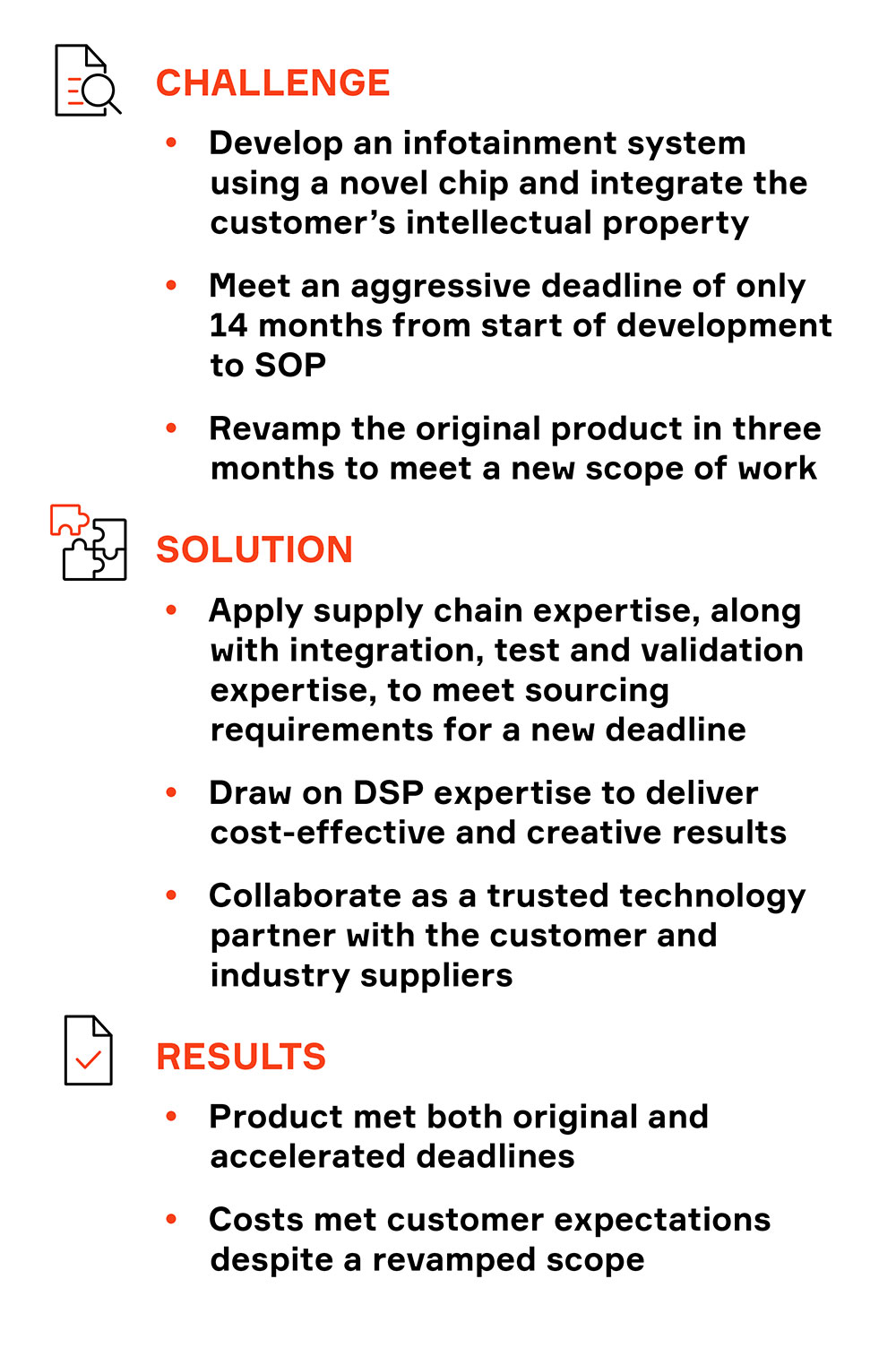Developing Zeekr’s Infotainment System Required Tight Teamwork on Tight Deadlines
OEMs need a partner that is not just reliable but also deeply knowledgeable, flexible and quick to respond. Premium Chinese electric vehicle brand Zeekr chose Aptiv to be that partner as it sought to enhance its user experience offerings by incorporating Qualcomm’s latest Snapdragon SA8295, a new system-on-chip (SoC) specifically designed for automotive infotainment.
As a testament to the competitiveness and speed of the local market, Zeekr set an aggressive deadline of only 14 months from start of development to start of production (SOP). It sought a technical partner to provide a stable platform that would include hardware and base software to run and integrate the applications and human-machine interface it was developing.
Zeekr aimed for two SOPs, with uncompromising targets. The initial production launch would be October 2023, with a second set for March 2024. To meet their deadlines, Aptiv’s team members challenged themselves to develop two different hardware platforms simultaneously rather than following the usual sequence of completely developing one and then using it as the framework for the next. This way, they could rapidly and efficiently lay the foundation for four vehicle models.
Collaboration at the Forefront
Aptiv’s digital signal processor (DSP) experience is one example of what made it an ideal partner to help Zeekr achieve its tight deadlines on budget. It recognized that incorporating an audio DSP into an infotainment system SoC could save the OEM from having to integrate a separate XMOS chip for audio, and thus reduce the overall system cost. OEMs have historically not made full use of the DSP cores on their main SoCs, but Aptiv, with its decades-long expertise in DSPs, was able to integrate an audio DSP into the SoC, streamlining the system and saving bill-of-materials costs for Zeekr.
The scope of work also included combining the driver cluster and in-vehicle infotainment system into one box. That required significant computing power, including CPUs and GPUs, as well as NPUs (neural processing units) — chips purpose-built to run AI and machine learning algorithms.
Aptiv provided the majority of the software, incorporating QNX as the base operating system and creating middleware, drivers, audio and DSPs. The mandate from Zeekr included implementing brightness functions in FOTA (firmware over-the-air) technology and getting the microcontroller unit and SoC to communicate, as well as optimizing bandwidth utilization and reducing transmission errors. To fulfill these highly resource-intensive requirements and meet the tight timelines, Aptiv dedicated its own local engineering talent, drawing from a pool with deep expertise in software tools.
Navigating Twists in the Road
When a memory chip shortage affected the original design, the difficulty level went up another notch, requiring a major change three months before the second deadline. The team essentially had to skip what would have been a 2.0 release and went directly to a 2.5 release. The challenge played to one of Aptiv’s strengths: handling logistics and supply change management on a tight turnaround.
Aptiv’s long-established connections with Chinese vendors and manufacturers mean that it is well positioned to support such mitigations to facilitate operations at scale. Aptiv has made supply chain resiliency a hallmark of how it supports customers, including creating a digital twin that traces supply chain sourcing, fluctuations and potential disruptions in real time.
Supporting the revised scope also required revalidating safety-certified systems, retooling, and performing other critical revamps in manufacturing — all challenges that Aptiv has extensive expertise in handling. Much of the eventual success was due to the seamless coordination between the Zeekr and Aptiv engineers, who worked as one team to deliver the project while coordinating closely with Qualcomm to expedite deliveries.
Lessons Learned
Success comes from a culture of partnership and flexibility matched with the engineering expertise to quickly execute on inevitable challenges and necessary changes in scope. Aptiv succeeded because its engineers could draw from decades of experience in DSPs; advanced compute, validation and testing; integration of software applications from a wide range of sources; and sophisticated supply chain management that includes digitized, unified tools and deep local vendor relationships.
Challenge
- Develop an infotainment system using a novel chip and integrate the customer’s intellectual property
- Meet an aggressive deadline of only 14 months from start of development to SOP
- Revamp the original product in three months to meet a new scope of work
Solution
- Apply supply chain expertise, along with integration, test and validation expertise, to meet sourcing requirements for a new deadline
- Draw on DSP expertise to deliver cost-effective and creative results
- Collaborate as a trusted technology partner with the customer and industry suppliers
Results
- Product met both original and accelerated deadlines
- Costs met customer expectations despite a revamped scope
